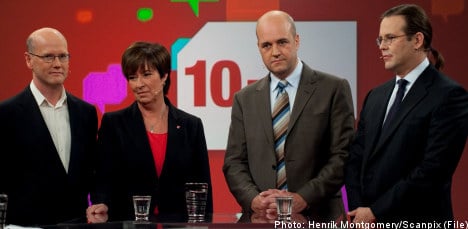Sweden’s center-right coalition government finds itself swimming in muddied waters after evidently losing its parliamentary majority in neck-and-neck general elections over the weekend. The anti-immigration Sweden Democrats played the role of spoiler, winning seats in the unicameral chamber for the first time.
Adding to the political murk were the as-of-yet uncounted postal votes, which could conceivably tip the balance, helping Fredrik Reinfeldt and the rest of the Alliance parties eke out a clear majority.
Preliminary election results on Sunday gave the four Alliance parties, the Moderates, Liberals, Christian Democrats, and the Centre Party, 172 seats in the 349-seat parliament. Only three more seats are needed to achieve a full majority.
Either way, however, prime minister Reinfeldt said his coalition partners were prepared to remain in office as a minority government, a situation which is far from unusual in Sweden. Reinfeldt also firmly ruled out any form of cooperation with the Sweden Democrats, who received 5.7 percent of the vote.
But Reinfeldt’s government will need some sort of backing on legislation from one or more opposition parties in the Red-Green Alliance, which consists of the Social Democrats, Greens, and the Left Party. Whether this could be achieved in a hung parliament is an unanswered question.
If all else fails, the last-ditch alternative for the government is new elections.
Among the big winners following the elections was Reinfeldt’s own Moderate Party, which captured 30.0 percent of votes in a well-executed campaign emphasizing Sweden’s remarkable political and economic stability in a turbulent world. The nation weathered the recession well, despite mass unemployment, and economic growth this year is the highest in Western Europe.
In addition, polls suggested that Reinfeldt himself was perceived by the public as the best prime ministerial candidate in a campaign of personalities that felt almost presidential. His “feel good” image appealed in particular to middle class voters in metropolitan regions.
The biggest losers in the weekend drama were the once-powerful Social Democrats, who have governed Sweden for 65 of the past 78 years. Voters handed them their worst defeat since 1914, with the party only receiving 30.9 percent of the vote, giving them a projected 113 seats.
Social Democratic leader Mona Sahlin, conceding defeat, said it was an election without winners. “We did very badly. We lost,” she told disappointed supporters at the party’s election eve wake in Stockholm. Her future as party leader was in some doubt after the disastrous showing as Social Democrats spent much of Monday conducting closed-door crisis talks.
Commentators attributed the Social Democrats’ failure to lackluster leadership and an inability to spell out ideological differences with the ruling coalition: both blocs have consistently positioned themselves in the middle of the political spectrum.
Both coalitions lost seats to the Sweden Democrats with their aggressive anti-immigrant and Eurosceptic profile. Led by youthful Jimmie Åkesson, the party’s 5.7 percent of the vote gave it a projected 20 seats in its first national breakthrough.
Åkesson, 31, said he was prepared to cooperate with the political establishment, as long as his signature issues are addressed. Powering his campaign was the recession as well as disenchantment by unemployed youth and others who feel excluded. Racist overtones were plain.
Immigrants account for 14 percent of Sweden’s population, just above the North European average and the Sweden Democrats’ breakthrough in tolerant nation like Sweden echoes earlier successes by populist, right-wing parties elsewhere in Europe.
Reinfeldt and his Alliance ended Social Democratic hegemony four years ago on a platform of lower taxation and trimmed welfare benefits After winning the chancellery, his coalition struck a blow against the traditionally powerful trade unions by eliminating the income tax deduction of membership dues. Members left in droves.
He then lowered personal income taxation and eliminated the inheritance tax while also cutting unemployment benefits, actions with the left argued left pensioners, hospitals, schools and other public services in a state of benign neglect.
The Alliance also succeeded in carrying out a wave of privatizations, selling off the state’s shares in a number of companies, including Vin & Sprit, the makers of the famed Absolut vodka brand. The state pharmacy monopoly ended as well. And the management of a number of schools, old age homes and daycare centres was picked up by private interests.
In addition, tax breaks were extended to middle class homeowners choosing to renovate, and a tax incentive system was introduced to encourage the hiring of home help.
During the election campaign, the Social Democrats charged that Sweden’s cherished welfare state — as well the country’s tradition of fairness and compassion — was threatened by the government’s budget cuts. Others suggested that the essential elements of welfare system were still intact. But the edges were frayed.
But the Red-Greens’ charges that the centre-right was in the process of a radical transformation of the Swedish state and Swedish society were muffled by the government’s main triumph – namely, successfully leading the country through the global recession.
In the minds of many voters, the Moderates had learned a lot about weathering economic storms since the banking crisis of the early 1990s. With finance minister Anders Borg at the helm, the banking sector weathered the financial crisis well, and real estate prices remained intact.
Unemployment is still high, hovering around 8 percent, but Sweden’s current 4 percent GDP growth rate is among the highest in Europe, making the Red-Greens’ scare tactics hard for many voters to swallow.
But while the Moderates are cheering the fact that they are now a political force in Sweden on par with the long-dominant Social Democrats, both parties and their coalition partners are wringing their hands about how to handle the Sweden Democrats’ march into the Riksdag.
Clearly, changes are afoot in Swedish politics, but exactly what this new political constellation will mean for the country remains to be seen.
Roger Choate has covered Swedish elections for many years as onetime correspondent for The Times (London) and other international media. He is presently a communications consultant.



 Please whitelist us to continue reading.
Please whitelist us to continue reading.
Member comments